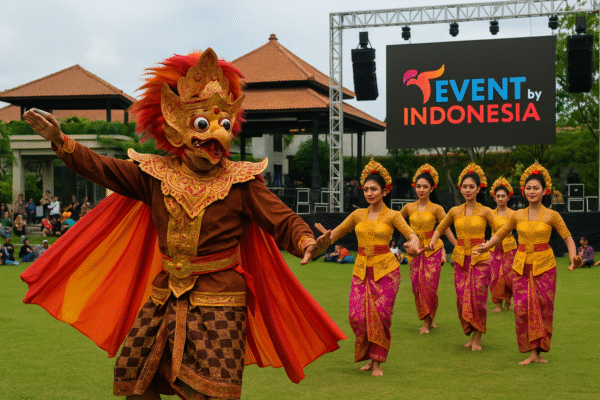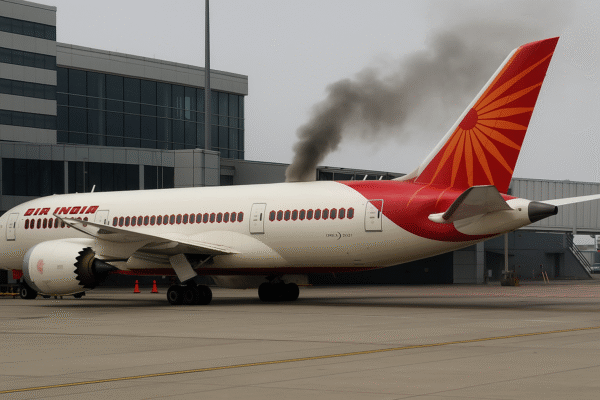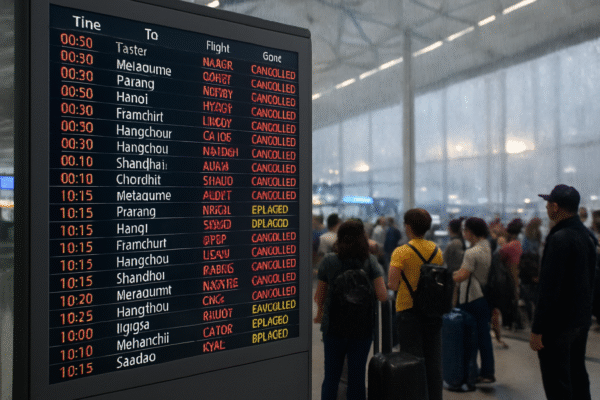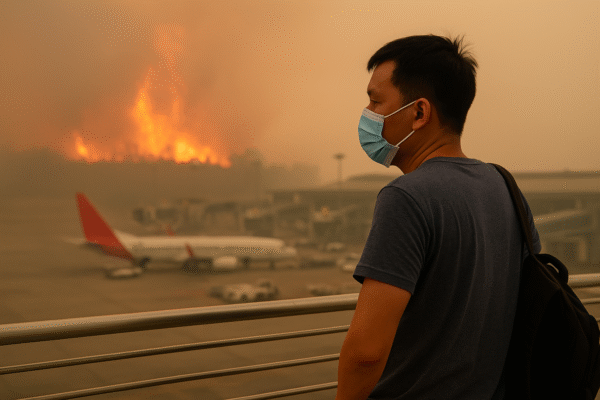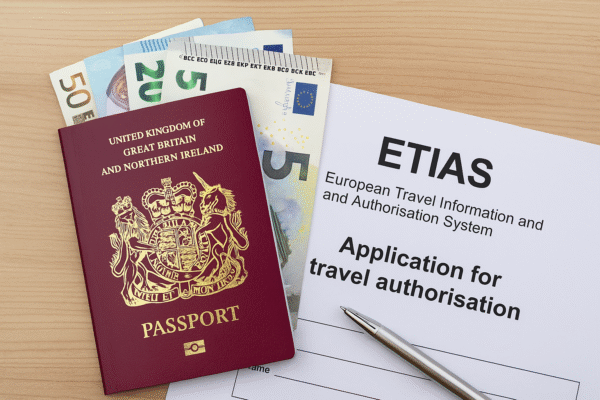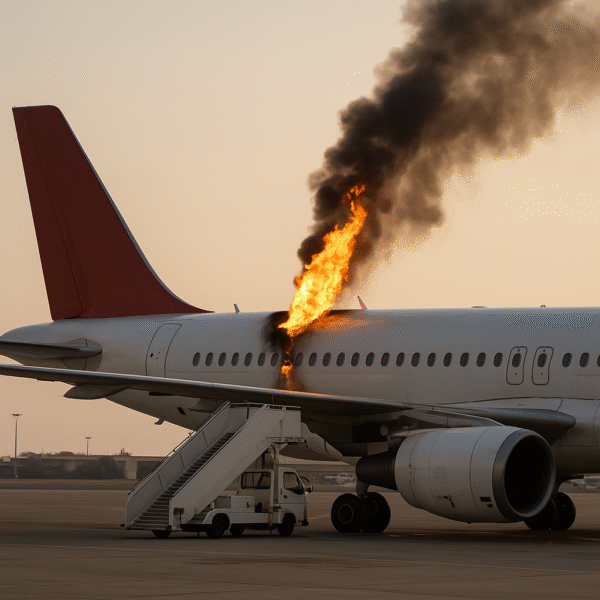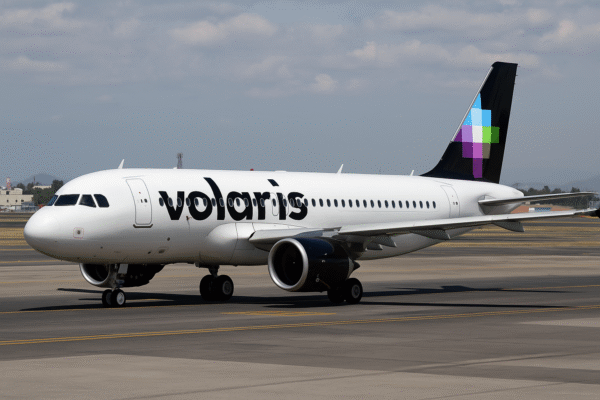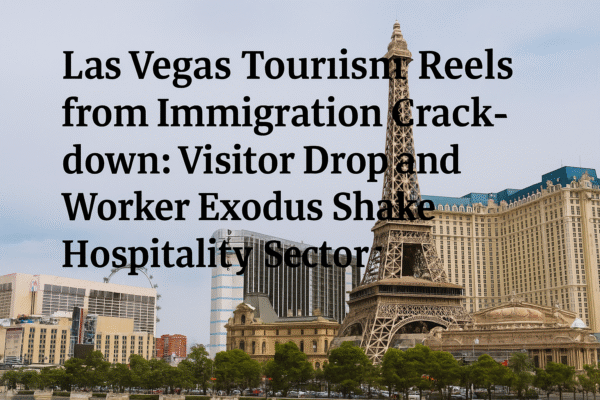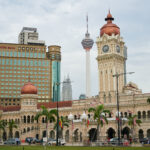Las Vegas, Nevada – July 2025 – One of the world’s most iconic entertainment destinations is grappling with a sharp downturn in tourism and labor availability as the effects of strict U.S. immigration enforcement ripple through its core industries. The city of Las Vegas, which thrives on a dynamic and multicultural workforce, is experiencing significant visitor declines and operational disruptions as heightened immigration measures create fear among workers and discourage international travel.
According to the Las Vegas Convention and Visitors Authority (LVCVA), visitor numbers dropped 6.5% in May 2025 compared to the same period in 2024. Hotels reported a 5.7% dip in revenue, and forward bookings for international groups have seen a marked reduction. Industry stakeholders say these changes are directly linked to immigration enforcement policies, which are creating anxiety among both immigrant workers and international visitors.
Immigrant Workforce at Risk
Nevada’s hospitality and tourism economy depends heavily on immigrant labor. Roughly 25% of the state’s total workforce is foreign-born, far exceeding the U.S. national average of 17%, according to the Migration Policy Institute. In Las Vegas, the concentration is even higher within key tourism sectors—immigrants make up 74% of hotel housekeepers and 51% of restaurant line cooks.
However, aggressive immigration enforcement across Southern Nevada has triggered widespread fear. Local immigrant advocacy organizations have reported a 40% increase in immigration detentions compared to last year. Notably, nearly 70% of those detained have no criminal record, sparking concern over indiscriminate raids and disruptions in workplaces.
The psychological toll is growing. Many immigrant workers are either reducing their hours or quitting jobs altogether out of fear of workplace raids. Businesses that rely on a stable workforce to deliver high-quality guest experiences are now operating with significant labor shortages, further affecting the quality of service offered to tourists.
Business Closures and Economic Impacts
A striking example of this disruption occurred in June 2025 when Broadacres Marketplace in North Las Vegas, a popular open-air shopping venue catering to tourists and locals alike, shut down operations temporarily due to fears of immigration raids. This unprecedented closure underscored the fragility of businesses dependent on immigrant participation and patronage.
Hotels and restaurants are now under pressure to revise staffing schedules, cut services, and delay expansion plans. Labor instability has also affected trade show logistics and convention hosting, two of the most critical revenue streams for the Las Vegas economy.
International Visitors Reconsider Travel
The crackdown has not only impacted workers but also discouraged international tourists, especially those from Canada, Mexico, and Latin America. According to travel analysts, many potential visitors are rethinking trips to the United States, concerned about potential delays, profiling, and negative experiences at ports of entry.
Tour operators in Latin America have reported increasing cancellations for group travel to Las Vegas. Industry insiders suggest that Latino families and Canadian tourists, two key demographic segments for Las Vegas, are now seeking alternative destinations perceived to be more welcoming.
While the LVCVA attributes the visitor dip partly to broader economic concerns—including inflation and currency fluctuations—labor unions and advocacy groups argue that immigration policy plays a significant role in shaping tourist perceptions and behaviors.
Political Response and Industry Reaction
Las Vegas Mayor Carolyn Goodman and local business leaders have voiced concern about the long-term implications of restrictive immigration policies on the city’s tourism economy. With the 2026 FIFA World Cup and 2028 Summer Olympics expected to boost inbound tourism across North America, stakeholders warn that continued instability could compromise Las Vegas’ ability to compete as a host city and leisure destination.
Nevada Hospitality Association Executive Director James Kent commented, “We need to protect our workforce, which is the lifeblood of the tourism industry. Without a reliable, respected labor pool, we jeopardize everything from guest satisfaction to global competitiveness.”
Unions representing hospitality workers have ramped up pressure on state legislators to adopt more protective labor policies, including support for undocumented workers and measures to prevent sudden detentions during work hours.
National Policy Context
This situation in Las Vegas echoes broader concerns across the U.S. tourism industry. Since 2021, stricter immigration enforcement has targeted key industries such as hospitality, agriculture, and food services. In cities like New York, Miami, and Los Angeles, businesses are reporting similar challenges, with economic output impacted by uncertainty surrounding immigrant labor.
In a recent U.S. Travel Association report, analysts noted that foreign tourist spending in the United States is projected to drop by 7% in 2025, with policy-related deterrents contributing to the slowdown. The report emphasized that tourism recovery post-COVID remains fragile and that federal immigration enforcement must balance national security with economic sustainability.
The Road Ahead for Las Vegas
Las Vegas has always thrived on its reputation as a welcoming, energetic, and multicultural destination. As it prepares to host major global events and welcome millions more in the coming years, city and state leaders must confront the reality that immigration policy is now a critical tourism issue.
To sustain the city’s tourism engine, experts urge federal and local collaboration on creating legal pathways for foreign workers, reassessing enforcement protocols at entertainment hubs, and restoring international trust in Las Vegas as a safe and inviting travel destination.
Without decisive action, the ongoing disruption could evolve into a long-term crisis—eroding the very foundation of what has made Las Vegas a global icon for hospitality and entertainment.
For more travel news like this, keep reading Global Travel Wire

